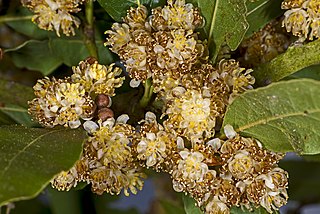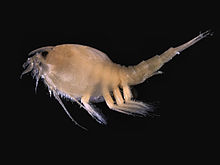
The Apiales are an order of flowering plants. The families are those recognized in the APG III system. This is typical of the newer classifications, though there is some slight variation and in particular, the Torriceliaceae may also be divided.

Asterales is an order of dicotyledonous flowering plants that includes the large family Asteraceae known for composite flowers made of florets, and ten families related to the Asteraceae. While asterids in general are characterized by fused petals, composite flowers consisting of many florets create the false appearance of separate petals.

The Brassicales are an order of flowering plants, belonging to the eurosids II group of dicotyledons under the APG II system. One character common to many members of the order is the production of glucosinolate compounds. Most systems of classification have included this order, although sometimes under the name Capparales.

The Laurales are an order of flowering plants. They are magnoliids, related to the Magnoliales.

A language family is a group of languages related through descent from a common ancestral language or parental language, called the proto-language of that family. The term "family" reflects the tree model of language origination in historical linguistics, which makes use of a metaphor comparing languages to people in a biological family tree, or in a subsequent modification, to species in a phylogenetic tree of evolutionary taxonomy. Linguists therefore describe the daughter languages within a language family as being genetically related. The divergence of a proto-language into daughter languages typically occurs through geographical separation, with different regional dialects of the proto-language spoken by different speech communities undergoing different language changes and thus becoming distinct languages from each other.
The British royal family comprises King Charles III and his close relations. Charles is the head of the House of Windsor. There is no strict legal or formal definition of who is or is not a member, although the Royal Household has issued different lists outlining who is a part of the royal family. Members often support the monarch in undertaking public engagements, and pursue charitable work and interests. The royal family are regarded as British and world cultural icons.

The Emmy Awards, or Emmys, are an extensive range of awards for artistic and technical merit for the American and international television industry. A number of annual Emmy Award ceremonies are held throughout the calendar year, each with their own set of rules and award categories. The two events that receive the most media coverage are the Primetime Emmy Awards and the Daytime Emmy Awards, which recognize outstanding work in American primetime and daytime entertainment programming, respectively. Other notable U.S. national Emmy events include the Children's & Family Emmy Awards for children's and family-oriented television programming, the Sports Emmy Awards for sports programming, News & Documentary Emmy Awards for news and documentary shows, and the Technology & Engineering Emmy Awards and the Primetime Engineering Emmy Awards for technological and engineering achievements. Regional Emmy Awards are also presented throughout the country at various times through the year, recognizing excellence in local and statewide television. In addition, the International Emmy Awards honor excellence in TV programming produced and initially aired outside the United States.
A stepfamily is a family where at least one parent has children who are not biologically related to their spouse. Either parent, or both, may have children from previous relationships or marriages. Two known classifications for stepfamilies include "simple" stepfamilies, where only one member of the family's couple has a prior child or children and the couple does not have any children together, and "complex" or "blended" families, where both members of the couple have at least one child from another relationship.

The herons are long-legged, long-necked, freshwater and coastal birds in the family Ardeidae, with 72 recognised species, some of which are referred to as egrets or bitterns rather than herons. Members of the genera Botaurus and Ixobrychus are referred to as bitterns, and, together with the zigzag heron, or zigzag bittern, in the monotypic genus Zebrilus, form a monophyletic group within the Ardeidae. Egrets do not form a biologically distinct group from herons, and tend to be named differently because they are mainly white or have decorative plumes in breeding plumage. Herons, by evolutionary adaptation, have long beaks.

The pacarana is a rare and slow-moving hystricognath rodent indigenous to South America. Native Tupi people call it the pacarana because it is superficially similar to the paca, a different rodent which is not in the same family. The pacarana has a chunky body and is large for a rodent, weighing up to 15 kg (33 lb) and measuring up to 79 cm in length, not including the thick, furry tail.

The Oxalidaceae, or wood sorrel family, are a small family of five genera of herbaceous plants, shrubs and small trees, with the great majority of the 570 species in the genus Oxalis. Members of this family typically have divided leaves, the leaflets showing "sleep movements", spreading open in light and closing in darkness.

Acholeplasmataceae is a family of bacteria. It is the only family in the order Acholeplasmatales, placed in the class Mollicutes. The family comprises the genera Acholeplasma and Phytoplasma. Phytoplasma has the candidatus status, because members still could not be cultured.

Velloziaceae is a family of monocotyledonous flowering plants. The APG II system, of 2003, also recognizes this family, and assigns it to the order Pandanales.

The Stemonaceae are a family of monocotyledonous flowering plants placed in the order Pandanales. The family consists of four genera with ca 37 known species distributed in areas with seasonal climate across Southeast Asia and tropical Australia. One native species is found in the United States. In earlier systems the family was called Roxburghiaceae, after Roxburghia, now Stemona.
An honor killing, honour killing, or shame killing is the murder of an individual, either an outsider or a member of a family, by someone seeking to protect what they see as the dignity and honor of themselves or their family. Honor killings are often connected to religion, caste, other forms of hierarchical social stratification, or sexuality. Most often, it involves the murder of a woman or girl by male family members, due to the perpetrators' belief that the victim has brought dishonor or shame upon the family name, reputation or prestige. Honor killings are believed to have originated from tribal customs. They are prevalent in various parts of the world, especially in MENA countries, as well as in immigrant communities in countries which do not otherwise have societal norms that encourage honor killings. Honor killings are often associated with rural and tribal areas, but they occur in urban areas as well.

Family is a group of people related either by consanguinity or affinity. It forms the basis for social order. The purpose of the family is to maintain the well-being of its members and of society. Ideally, families offer predictability, structure, and safety as members mature and learn to participate in the community. Historically, most human societies use family as the primary locus of attachment, nurturance, and socialization.
Laws regarding incest vary considerably between jurisdictions, and depend on the type of sexual activity and the nature of the family relationship of the parties involved, as well as the age and sex of the parties. Besides legal prohibitions, at least some forms of incest are also socially taboo or frowned upon in most cultures around the world.
The American Mafia, commonly referred to in North America as the Italian American Mafia, the Mafia, or the Mob, is a highly organized Italian American criminal society and organized crime group. The organization is often referred to by its members as Cosa Nostra and by the American government as La Cosa Nostra (LCN). The organization's name is derived from the original Mafia or Cosa Nostra, the Sicilian Mafia, with "American Mafia" originally referring simply to Mafia groups from Sicily operating in the United States, as the organization initially emerged as an offshoot of the Sicilian Mafia formed by Italian immigrants in the United States. However, the organization gradually evolved into a separate entity partially independent of the original Mafia in Sicily, and it eventually encompassed or absorbed other Italian immigrant and Italian American gangsters and Italian American crime groups active in the United States and Canada that were not of Sicilian origin. In North America, it is often colloquially referred to as the Italian Mafia or Italian Mob, though these terms may also apply to the separate yet related Sicilian Mafia or other organized crime groups in Italy or ethnic Italian crime groups in other countries.

The Hominidae, whose members are known as the great apes or hominids, are a taxonomic family of primates that includes eight extant species in four genera: Pongo ; Gorilla ; Pan ; and Homo, of which only modern humans remain.

The superasterids are members of a large clade of flowering plants, containing more than 122,000 species.















